Edie Melson's Blog, page 99
February 7, 2023
An Invitation for Writers & Pastors—Carolina Christian Writers Conference
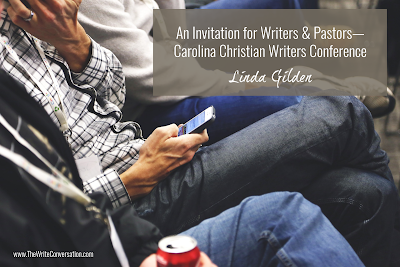
by Linda Gilden @LindaGilden
As we start a new year, I hope you have taken time to set some goals for your writing and figure out what you’d like to accomplish in 2023. When we assess our writing goals, we need to take a look at markets, article and book deadlines, and creative ways to sell books.
But don’t forget education. Writers need to continue to grow and learn more of the craft of writing. One of the best ways to do that is by attending conferences. In 2023 there are many great choices—Asheville Christian Writers Conference, Florida Christian Writers Conference, Carolina Christian Writers Conference , Write 2 Ignite, Blue Ridge Mountains Christian Writers Conference, and many, many more.
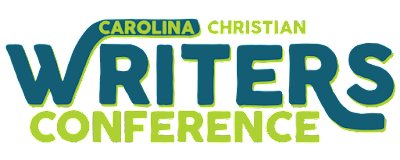
March 9, 2023Special day for pastors and ministry leaders.Come just for the day or add this on to the conference.Cost of Special Day for Pastors – $50
If you are serious about your writing (or thinking about getting serious) I would like to personally invite you to be part of the Carolina Christian Writers Conference. This conference takes place at the Hangar, First Baptist Church, Spartanburg, SC, March 10-11 and this year the faculty and staff are the best yet. (I know I say that every year but I really mean it!)
Courtney Johnson Rhodes and Dana Russell will be leading our worship will be leading our worship. They were with us last year and blessed us as we worshipped together.
If you have ever wanted to write fiction, now is the time to learn from the masters – Eva Marie Everson, Aaron Zook, Edie Melson, Cindy Sproles, Larry Leech, and Ginger will be there to share their expertise in that and other areas.
Karen Porter will lead an early bird class Friday morning. “The Anatomy of a Book.” This is an optional class (there is a small additional charge) but gives you two and a half hours of intense training as you prepare your book for submission to a publisher. This is an invaluable time and will take you quickly to the next step in your novel writing. Don’t miss it!
Other faculty members include Eva Marie Everson, Tammy Karasek, Edna Ellison, Jimmie Davis, Candy Arrington, Lori Hatcher, Terri Kelly, Patricia Durgin, Vincent Davis, Debbie Presnell, Katy Kauffman, Linda Goldfarb, Vincent Davis, Melissa Henderson, Les Stobbe. All bring different areas of expertise to the table such as marketing, nonfiction books, Children’s books, and articles, and much more are anxious to meet with you and help you along with your writing.
Many publishers will be represented. All are eager to consider your work for their publications or give you direction as to where might be a suitable, prospective market. Meetings with the professionals are included in your tuition as is Saturday lunch. Lots of opportunities will be present for spending time with the faculty. Manuscript critiques and scholarships are also available. Details are on the Carolina Christian Writers Conference website .
Don’t miss this opportunity to learn from the best and take your writing to the next level. Perhaps your goal for 2023 is to write a book. Come let the professionals at the Carolina Christian Writers Conference help you progress to the next level. There is room for you and a friend. Register for the Carolina Christian Writers Conference today!
TWEETABLEAn Invitation for Writers & Pastors—Carolina Christian Writers Conference, from @LindaGilden on @EdieMelson (Click to Tweet)
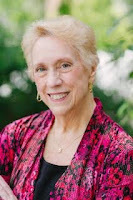 Linda Gilden has coauthored 11 books with 5 different coauthors and has #12 and #13 coming out in 2022, adding a new co-author to the list. She loves every one of her coauthors and enjoys collaborating on interesting projects with them. She also has written many books on her own and realizes what a treasure and blessing a good co-author is.
Linda Gilden has coauthored 11 books with 5 different coauthors and has #12 and #13 coming out in 2022, adding a new co-author to the list. She loves every one of her coauthors and enjoys collaborating on interesting projects with them. She also has written many books on her own and realizes what a treasure and blessing a good co-author is.
Published on February 07, 2023 22:00
February 6, 2023
Insight When the Setting IS The Story You’re Writing
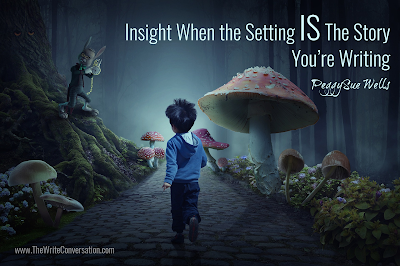
by PeggySue Wells @PeggySueWells
On July 6, 1944, 1000 freshly minted soldiers boarded the Louisville & Nashville Railroad in Indianapolis bound for the south. From there they would be sent to the European theater of World War II. Hours later, in Campbell County, Tennessee, the engine, tender, and four passenger cars careened over the side of the Jellico Narrows. Plunging down the 50-foot gorge and into the Clear River, the 418 Engine crashed into a massive boulder.
Setting is where your story takes place.
Settings come in four types: passive, active, functions like a character, and when the setting is the story.
Setting isTime PlaceSurroundingsMoodCultural nuancesHistorical periodA backdrop for a story
Setting is the story in books like The Perfect Storm, The Day The World Came To Town, and She Jumped the Tracks.A creative nonfiction that was made into a movie, The Perfect Storm by Sebastian Junger follows the 1991 perfect storm that ravaged North America from October 28 through November 4, 1991. The story follows the ferocity of the weather on boats, their crew, rescue personnel, and their families. Jim LeFede’s The Day The World Came To Town is the story of Gander, Newfoundland on 9-11 when 38 jetliners bound for the United States were forced to land at Gander International Airport in Canada by the closing of U.S. airspace. LeFede follows how a small town with a population of 10,300 respond to the unexpected arrival of 7,000 guests, many of which do not speak English and all in various stages of feeling confused, hungry, frightened, and angry.Similarly, She Jumped The Tracks by John P. Ascher recounts the largest troop train wreck in the United States. Hundreds of Campbell County residents flocked to the scene to help. They made the first rescues using block and tackle slings to hoist the wounded up the side of the gorge to the road. It often took up to ten men to hoist a body up to the road. Some brought welding torches to free the trapped soldiers. In all 34 men died and 75 were injured. Some survivors went on to fight in North Africa. The wreck left scars on the soldiers, their families, and touched the lives of everyone in Jellico for generations.
At the place in Clear River where the locomotive came to rest is a plaque. In the town square is a memorial with the names of the soldiers who perished in the crash. Adjacent to the hardware store is a home-made museum filled with accounts, news, photos, and memorabilia about the train, the wreck, and the important people whose lives were changed on that fateful day.
The welcome mat is out for those who come to remember, to grieve, and to try to understand. My first visit to Jellico was like a pilgrimage. As I studied the photos and newspaper stories, the elderly gentleman who runs the hardware store approached.
“Do you know someone who was on the train?”
“My grandfather.”
He nodded, understanding.
“How often do people come to your museum?”
“Every week.” He hitched the strap on his overalls. “People come who were on the train. Their families come. They have questions.”
There are four types of settings: passive, active, functions like a character, and when setting is the story.
The people of the tiny town of Jellico are the keepers of the flame. They understand their setting is the story. Within minutes of my arrival, the town’s librarian joined us as well as a photographer from the newspaper who took my photo. The librarian provided a packet of information, and a history DVD. He introduced me to his mother, now a great-grandmother, whose husband had been the teen who watched the train each evening travel the narrows, and who roused the town to rescue the injured and house the survivors.
Authors Sebastian Junger, Jim LeFede, and John P. Ascher wrote books where setting is the story. What stories have you read that center on the setting? Are you writing a story where setting is the theme?
TWEETABLEInsight When the Setting IS The Story You’re Writing, from author @PeggySueWells on @EdieMelson (Click to Tweet)
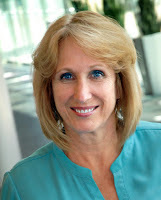 Tropical island votary and history buff, PeggySue Wells parasails, skydives, snorkels, scuba dives, and has taken (but not passed) pilot training. Writing from the 100-Acre Wood in Indiana, Wells is the bestselling author of thirty books including The Slave Across the Street, Slavery in the Land of the Free, Bonding With Your Child Through Boundaries, Homeless for the Holidays, Chasing Sunrise, and The Ten Best Decisions A Single Mom Can Make. Founder of SingleMomCircle.com, PeggySue is named for the Buddy Holly song with the great drumbeat. At school author visits, she teaches students the secrets to writing and speaks at events and conferences. Connect with her at www.PeggySueWells.com, on Facebook at PeggySue Wells, and LinkedIn at linkedin.com/in/peggysuewells
Tropical island votary and history buff, PeggySue Wells parasails, skydives, snorkels, scuba dives, and has taken (but not passed) pilot training. Writing from the 100-Acre Wood in Indiana, Wells is the bestselling author of thirty books including The Slave Across the Street, Slavery in the Land of the Free, Bonding With Your Child Through Boundaries, Homeless for the Holidays, Chasing Sunrise, and The Ten Best Decisions A Single Mom Can Make. Founder of SingleMomCircle.com, PeggySue is named for the Buddy Holly song with the great drumbeat. At school author visits, she teaches students the secrets to writing and speaks at events and conferences. Connect with her at www.PeggySueWells.com, on Facebook at PeggySue Wells, and LinkedIn at linkedin.com/in/peggysuewells
Published on February 06, 2023 22:00
February 5, 2023
10 Things Every Author Needs to Make a Book Signing Great
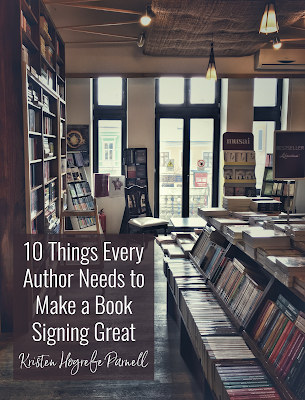
by Kristen Hogrefe Parnell @KHogrefeParnell
Last month, my church invited all the authors in the congregation to an “author tables” event in our fellowship area after services. Prior to my new release a few months ago, my previous book released in 2019. Needless to say, I had to brush up on my book signing preparations. If you’re anticipating an event, perhaps this list of essentials will be helpful for your next book signing.
10 Essentials for Your Book Signing
#1: Books
No brainer, right? However, make sure you order them far enough in advance to have the copies arrive well before your event.
#2: Displays/Presentation
Presentation is another area that requires planning. Are you going to use a banner or posters? Will you design them yourself or pay someone? How will you mount them? What type of assembly will be required?
I designed 11x17 posters and had them printed. A local craft store supplied the easels for easy display, but initially, I had the wrong size easel. Do a practice set-up at home before your event to work out any issues. Also, decide how you will indicate the cost of your books. Options include stickers directly on the books, a flyer, or display cards.
#3: Payment Options
Today’s buyers are increasingly cashless, so you will want to invest in a credit card reader, such as from Square or PayPal. Another cashless option is Venmo, which lets you set up a business account. Included is a free QR code kit. (You just have to request it.). You can then simply display your custom QR code for readers to scan.
Some readers still prefer cash. If you’re offering cash as a payment option, be sure to have change.
#4: Business Cards
Not only do business cards indicate you’re a professional, but they also provide a way for readers to connect with you outside of the event. Plus, they’re great for networking with other authors who might be there.
#5: Giveaways
Everyone likes something free. Bookmarks work well for us authors, but we aren’t limited to them. For my young adult trilogy, I had wristbands printed with the slogan from my books and used a vibrant green color. Several teens stopped by the table just to grab one.
Think about what your audience would most enjoy. When in doubt, candy works.
#6: Pens and Sticky Notes
You need to sign your books, so don’t forget something as basic as pens or markers. Sticky notes can be a real help, too. If you’re addressing the book to someone, ask the reader to spell the name on a sticky note for you to copy.
#7: Transportation/Cart
Carrying boxes of books is a good workout but not ideal if you’re dressed in heels or have to walk a distance from the parking lot to the exhibit area. Plan ahead how you’re going to transport your books and supplies. I used a foldable metal cart, which was a lifesaver.
#8: Personal Supplies
You’re going to want snacks and beverages for yourself. Pack crackers or a protein bar, mints, and plenty of water. If you travel with a baby like I do, don’t forget the diaper bag.
#9: Partner/Support Person
If possible, ask someone to do the event with you. When your table is busy, having a second person to answer questions or introduce your books makes sure no visitor gets overlooked. In the lulls, a companion helps pass the time. My support people were my husband and baby boy. I’m convinced my husband sells books better than I do, and my five-month-old draws a crowd simply with his smile.
#10: Table and Chairs
Unless you love standing for hours, ask if there are available chairs for yourself and your support person. Events usually supply tables, but don’t take them for granted either. Ask ahead if you need to bring a table, chairs, or both. Be sure to include a tablecloth, which adds a polished look to your display and gives you a place to hide boxes and extra books.
I wish you all the best with your events this year! If you’ve done book signings before, what would you add to this list?
TWEETABLE10 Things Every Author Needs to Make a Book Signing Great, tips from @KHogrefeParnell on @EdieMelson (Click to Tweet)
 Kristen Hogrefe Parnell writes suspenseful fiction from a faith perspective for women and young adults. Her own suspense story involved waiting on God into her thirties to meet her husband, and she desires to keep embracing God’s plan for her life when it’s not what she expects. Kristen’s books have won the Selah Award and the Grace Award, among others, and her romantic suspense novel Take My Hand is now available. An educator at heart, she also teaches English online and enjoys being a podcast guest. Kristen lives in the Tampa, Florida area with her husband and baby boy. Visit her online at KristenHogrefeParnell.com.
Kristen Hogrefe Parnell writes suspenseful fiction from a faith perspective for women and young adults. Her own suspense story involved waiting on God into her thirties to meet her husband, and she desires to keep embracing God’s plan for her life when it’s not what she expects. Kristen’s books have won the Selah Award and the Grace Award, among others, and her romantic suspense novel Take My Hand is now available. An educator at heart, she also teaches English online and enjoys being a podcast guest. Kristen lives in the Tampa, Florida area with her husband and baby boy. Visit her online at KristenHogrefeParnell.com.Featured Image: Photo by Sergiu Vălenaș on Unsplash
Published on February 05, 2023 22:00
February 4, 2023
Am I Helping or Hindering Other Writers

by Edie Melson @EdieMelson
For if anyone thinks he is something when he is nothing, he deceives himself. Galatians 6:3
I am incredibly privileged to direct the Blue Ridge Mountains Christian Writers Conference . As much as I LOVE what I do, this conference is always a blessing, and a trial for me to attend. A blessing because I get see first-hand the way God is using His people to impact the world. I also get to witness incredible acts of selflessness and encouragement. I always see multiple examples of grace in action.
Here, seasoned writers encourage, teach and network with those who are still working hard to get started on their publishing dreams. It seems everywhere I turn I see someone putting others ahead of themselves. I watched one generous writer give away her coveted editor appointment to another writer, and as a result the recipient moved several steps closer to her publishing goal. Beyond that, during the conference it's normal to see knots of attendees huddled together, praying for one another or celebrating good news.
The trial comes when I see the other side of human nature. In the stress-filled environment of a conference some revert to a more selfish way of carrying on. Their conversation tends to consist more of I and me, instead of you and yours. Even worse, their actions are subtly orchestrated to remind those around of their importance and yes, greed. The hardest thing about encountering this, is how obvious it is to everyone around.
So what do I do when I witness these sorts of individuals? I’ve discovered the first thing I need to do is pray—for myself. When I see this in others, I use it to remind me to be on guard against self-centeredness within my own heart. Because I guarantee you it’s there, even if I’ve managed to conquer it for the moment. I let the behavior I observe be a signpost, pointing to the fact that none of us is perfect and we all must work to react in a giving and grace-filled manner.
TWEETABLEAm I Helping or Hindering Other Writers, thoughts from author @EdieMelson (Click to Tweet)
 Edie Melson is a woman of faith with ink-stained fingers observing life through the lens of her camera. No matter whether she’s talking to writers, entrepreneurs, or readers, her first advice is always “Find your voice, live your story.” As an author, blogger, and speaker she’s encouraged and challenged audiences across the country and around the world. Her numerous books reflect her passion to help others develop the strength of their God-given gifts and apply them to their lives. Connect with her on her website, through Facebook, Twitter and Instagram.
Edie Melson is a woman of faith with ink-stained fingers observing life through the lens of her camera. No matter whether she’s talking to writers, entrepreneurs, or readers, her first advice is always “Find your voice, live your story.” As an author, blogger, and speaker she’s encouraged and challenged audiences across the country and around the world. Her numerous books reflect her passion to help others develop the strength of their God-given gifts and apply them to their lives. Connect with her on her website, through Facebook, Twitter and Instagram.Featured Image: Photo by Christina @ wocintechchat.com on Unsplash
Published on February 04, 2023 22:00
February 3, 2023
How Writing is Like a Journey

by Tim Suddeth @TimSuddeth
Lately, I’ve been thinking about going on a trip. Maybe it’s because conference time will start soon. Or maybe it’s because my family needs to get away for some relaxation. Or, most likely, because the weatherperson says that a cold front is coming and I’m sick of cold, rainy weather.
There are many reasons we go on trips: relaxation, business, exploration. And there are many reasons that we write.
If you’ve read many of my earlier posts on this website, you know I often compare taking a journey to writing. The similarities are numerous. But I’ve never looked at how the steps in each are comparable.
Five Steps in a Journey and in Writing
1. Planning
Before you start on a journey, you need to plan your trip. Where are you going? How many days will you be gone? Are you staying in a hotel or a tent or an RV? Driving, flying, or cruising?
The same is true in writing. Before you start, you need to decide whether you’re writing a poem, a devotion, an article, or a book. What resources/knowledge do you need and how long do you think it will take?
Maybe you don’t have a deadline, then you need to decide when you will write. A couple of hours a day, a couple of days a month, or anytime you can catch a couple of minutes like during your child’s soccer practice
One truism about time, if you don’t plan how to use it, it’ll just disappear.
2. Packing
I hate to pack. So, I usually wait until the last moment. However, when I’m off somewhere, I enjoy knowing I have everything that I might need.
For a writer, packing is all the unappreciated work that you need to do so you can write your best. It’s learning the craft. Learning your genres. Learning grammar. The lifelong prep work that a writer needs to do to get the most out of their writing.
I call it packing because you don’t fully appreciate what you have until you need it. It’s like packing a sweatshirt and needing it for a surprise cool evening at the beach. By knowing the craft of writing, and the expectations of your readers, it’s easier to complete your story.
(If I was a teacher, I would continue with the alliteration. But I’m an author, so I need to throw in a twist.)
3. Destination
Whether traveling or writing, it really helps to know where you’re going. You need to prepare and pack differently whether you’re going to a cottage on the beach, a ski villa, or flying across the Atlantic to Paris.
And the same is true with writing. Are you writing a story to share with your family and friends? Do you plan to self-publish and sell it on Amazon? Or will you try to get a traditional publisher to buy your book? Each of these is an impressive accomplishment. And each of them requires a very different set of skills.
There is another destination to consider. Do you want to write one story or several? Some people become so consumed with a story that they need to share, and that’s it. And then others enjoy, or at least come to appreciate, the process, and either have many stories in their heads or are always looking for them.
4. Serendipity
You have a plan. You’ve departed for your trip. But don’t become so focused on your destination that you miss the other sites along the way.
A beautiful mountain vista at a pullover beside the road. A colorful sunrise or sunset. The world’s largest mushroom. Paul Bunyan’s blue ox. Or an actual shopping mall.
Writing is often like that. No matter what you write or how you grow, there are other opportunities that will pop up. Maybe you have always written for blogs, but you can use those same skills to write articles for magazines, newspapers (they still exist), and journals. If you have your own blog, maybe you can guest write for a friend or a website you frequent.
Or, since you’ve learned the craft of writing, have you thought about teaching? Either a class or mentoring someone.
5. People
(I know. I went back to the alliteration. Like a brilliant author, I held back a final twist.)
One of my favorite things about going on a trip is the people I meet. It could be old friends I’m visiting, friends I’ve met before at a writer’s conference, or people that I run into that I’ve never met before.
I think this is especially true for writers when we meet other writers at a conference, a retreat, or just out. Many of us tend to be more introverted and meeting new people may cause a case of the hives.
But as Edie likes to remind us at the Blue Ridge Mountains Christian Writers Conference, the people we meet there are our tribe. They are writers, too. They understand us. They can appreciate the blank look that sometimes cross our faces, or that we may ask for prayer for someone who we forgot is a fictional character in one of our stories.
As she says, “They get us.”
Traveling and writing. Both of them add so much to life. They offer us new opportunities and new relationships. And these five steps show us just how fulfilling they can be.
Do you have a trip coming up soon?
TWEETABLEHow Writing is Like a Journey, insight from writer @TimSuddeth on @EdieMelson (Click to Tweet)
 Tim Suddeth is a stay-at-home dad and butler for his wonderful, adult son with autism. He has written numerous blogs posts, short stories, and three novels waiting for publication. He is a frequent attendee at writers conferences, including the Blue Ridge Mountain Christian Writers Conference and a member of Word Weavers and ACFW. He lives near Greenville, SC where he shares a house with a bossy Shorky and three too-curious Persians. You can find him on Facebook and Twitter, as well as at www.timingreenville.com and www.openingamystery.com.
Tim Suddeth is a stay-at-home dad and butler for his wonderful, adult son with autism. He has written numerous blogs posts, short stories, and three novels waiting for publication. He is a frequent attendee at writers conferences, including the Blue Ridge Mountain Christian Writers Conference and a member of Word Weavers and ACFW. He lives near Greenville, SC where he shares a house with a bossy Shorky and three too-curious Persians. You can find him on Facebook and Twitter, as well as at www.timingreenville.com and www.openingamystery.com.
Published on February 03, 2023 22:00
February 2, 2023
Worldbuilding 101 for Writers: Do you know the history of your story world?
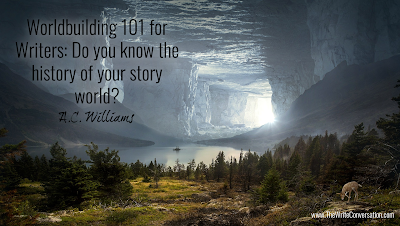
by A.C. Williams @ACW_Author
When you hear the term worldbuilding, what comes to your mind? It’s probably some epic fantasy like Lord of the Rings or a legendary space opera like Star Wars or Star Trek, right? With all those freaky aliens or hard to pronounce names and unnecessarily long titles (i.e. Daenerys of the House Targaryen, the First of Her Name, The Unburnt, Queen of the Andals, the Rhoynar and the First Men, Queen of Meereen, Khaleesi of the Great Grass Sea, Protector of the Realm, Lady Regnant of the Seven Kingdoms, Breaker of Chains, and Mother of Dragons … yikes.).
Well, here’s an interesting fact: Worldbuilding isn’t just for speculative fiction. Granted, that’s where you hear about it most, and in most speculative fiction the world plays an integral role in the actual story. But a foundational understanding of how to build a fictional world will serve every author, even the ones who don’t intentionally include too many consonants in a character’s name!
So for the next few months, we’re going to be talking about the basics of worldbuilding and what elements you need to create a believable fictional world in which to place your story.
Now, since I am wired for speculative, that’s probably the majority of examples I will use. And, to be fair, most of the time the focus in a speculative story needs to be on the world. It’s a requirement of the genre. But I believe there’s enough here that those who don’t write speculative will find plenty to use!
Unfortunately, I don’t have a handy acronym this time around. The last series I did on character development was PC CHILIDOG, which was silly but memorable. Maybe y’all will be able to help me find a name for this series! Until then, we’ll just call it Worldbuilding 101.
So, here we go: The first point I want to talk about in the basics of building a fictional world is that your world needs existing history.
Unless you're beginning with a world recently created by a Higher Power, your world will have history. It should. If you've got a bustling metropolis in the middle of a barren wasteland, how did it get there? It didn't just happen.
Like in reality, the great cities and structures we know didn’t just appear overnight. Someone had to design them, build them, decorate them, etc. That’s how we know so much about the ancient, now-extinct civilizations. Think of the pyramids. Think of the Mayan ruins in Tikal, Guatemala. The cave paintings littered across Europe. All of that points to civilizations that existed before history was recorded.
As a Christian, one of my favorite parts of reading the Bible is to identify the historical people and places in the different stories. So much of Scripture has been proven true over the years, and, though it’s not a history book, it has always been a trustworthy source of historical information.
For your fictional world, make sure it has a history.
Where did the people come from? How did their civilization begin? How old is your civilization? If you’ve got a country that’s 50 years old, it won’t be as developed as a country that’s 300 years old. Think of America in the 1800s versus America now.
Was your current civilization built on the ruins of an older civilization? Or did it grow organically?
What if your people don’t know their history? That’s a fun story option. If you’ve got a technologically advanced people who don’t know where they came from, that would be a neat concept to track down.
In the Lord of the Rings books, there’s thousands and thousands of years of recorded history that the characters draw from. It’s similar in series like Game of Thrones, and it’s getting to be that way in the Star Wars novels (not quite the movies yet). But then you’ve got The Shannara series by Terry Brooks that is set in a post-apocalyptic, future version of our own world.
One of the challenges of worldbuilding is that it’s not meant to be the main story, nor is it meant to be your main character. Even if your readers never understand how deep your world goes, you—as the author—need to know, because it informs your characters’ behaviors.
So, whether you’re writing an epic fantasy with detailed maps and magical cultures, or you’re writing a mystery thriller set in the 1940s, you need to make sure you know the history you’re building on.
TWEETABLEWorldbuilding 101 for Writers: Do you know the history of your story world? @ACW_Author on @EdieMelson (Click to Tweet)
 Award-winning author, A.C. Williams is a coffee-drinking, sushi-eating, story-telling nerd who loves cats, country living, and all things Japanese. She’d rather be barefoot, and if she isn’t, her socks won’t match. She has authored eight novels, two novellas, three devotional books, and more flash fiction than you can shake a stick at. A senior partner at the award-winning Uncommon Universes Press, she is passionate about stories and the authors who write them. Learn more about her book coaching and follow her adventures online at https://www.amycwilliams.com.
Award-winning author, A.C. Williams is a coffee-drinking, sushi-eating, story-telling nerd who loves cats, country living, and all things Japanese. She’d rather be barefoot, and if she isn’t, her socks won’t match. She has authored eight novels, two novellas, three devotional books, and more flash fiction than you can shake a stick at. A senior partner at the award-winning Uncommon Universes Press, she is passionate about stories and the authors who write them. Learn more about her book coaching and follow her adventures online at https://www.amycwilliams.com.
Published on February 02, 2023 22:00
February 1, 2023
A Deadline Acrostic for Writers

by Lynn H. Blackburn @LynnHBlackburn
It’s deadline season friends. This is the fourth year in a row that I’ve had a book due on March 1. This is third year in a row that I’ve also had a book releasing on or near March 1.
This means that my brain is not a very happy place right now. I’m thinking about publicity, marketing, and launching a book. But I’m also frantically trying to finish writing a book. It’s a lot.
Which is why I want to bring you a fun little acrostic to help you remember the important things the next time you’re on a deadline.
A Writer's Deadline
D - Dehydration must be avoided at all costs. That means it’s critical to drink. No. Not that kind of drinking. I’m talking about the caffeinated kind of drinking. Coffee, tea, soft drinks. They even have caffeinated water now - have you seen this? (If you’ve tried it, I need details). Now, as you may know, caffeine actually dehydrates you, so … yeah … hmm … well, I’m on a deadline so I’m not changing it. Just drink a lot. Some of it should be water.
E - Eating is important, too. This is the part where I should say something like, “get a mix of fruits, veggies, protein, and healthy fats”—so, there. I said it. We all know what’s really happening. A lot of takeout. Probably some pizza delivery. There will be carbs. Oh, yes, there will be carbs.
A - Ambulate. While it’s true that you won’t get many words written while going for a walk, you need to move your body. A certain writer I know (cough, cough) injured herself WHILE DRYING HER HAIR because she’d spent too much time sitting in her chair and not enough time moving and stretching. This same writer (clears throat loudly) was tortured by a massage therapist last week because she’s been sitting too much and her hips, back, neck, etc. are most displeased. GET THEE FROM THY CHAIR. Go outside. Breathe. Move. Play with your pets. You might even want to watch TV or read a book. Bake something (you’re going to need it!). Draw. Sing. Dance. Crochet. Your body and brain will thank you.
D - Doze. Unless you’re under thirty, you have to get some sleep. I’m forty-eight. All-nighters are out of my reach. There is no amount of caffeine that can stop this. Go to bed. Close your eyes. Sleep. Writing while sleep deprived will not endear you to your editor.
L - Leave the computer every now and then. Spend time with your people. Grab lunch with a friend. Or you can do what I’m doing when you read this. YOU CAN LEAVE TOWN. Seriously. Get away and write in a different environment. Shake things up. Give yourself time to focus on the words without any distractions.
I - Include others. Don’t go it alone. Join other writers in writing sprints. Tell your readers what’s going on. Share it on social media or in your newsletter. Ask for prayer. Make sure your people know that you aren’t mad at them, and that you will come out of your deadline cave … eventually. If you leave town, consider leaving with a few friends who will make sure you’re eating, drinking, ambulating, dozing, and occasionally leaving your computer!
N - Note what works and what doesn’t. Lord willing, this won’t be your last deadline. So pay attention. Did you do something that was a disaster? Did you do something that worked beautifully? Make a note so you can either avoid or repeat it the next time. As I mentioned above, there’s this writer I know who has learned the hard way that if she doesn’t take care of her body, she loses writing time because she can’t move her neck or arms. That writer, even though she is super busy, has made time for massages and chiropractor visits during the final eight weeks of her deadline. She’s also stretching at home and getting out of her chair more often. On a more positive note, she’s learned in the past that running away from home for a few days while in the homestretch is a game changer, so she’s doing that this week. Make note of your own things that work or don’t work—food, activities, drinks, rest, etc.—so you don’t forget.
E - Entreat your Creator, the God of the Universe, the Word made flesh, the One for whom and by whom all things exist. He gave you the gift. Your words are an act of worship, and they are for His glory. Don’t attempt to write without bringing your offering before God and asking Him for wisdom, for creativity, and for clarity as you strive to do your very best for Him.
I’d love to hear what you would include on your deadline acrostic!
(And, no kidding, prayers appreciated. This book won’t write itself!)
Grace and peace,Lynn
TWEETABLEA Deadline Acrostic for Writers from author @LynnHBlackburn on @EdieMelson (Click to Tweet)
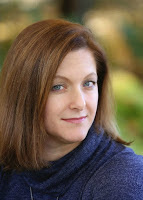 Lynn H. Blackburn loves writing romantic suspense because her childhood fantasy was to become a spy, but her grown-up reality is that she's a huge chicken and would have been caught on her first mission. She prefers to live vicariously through her characters and loves putting them into all kinds of terrifying situations while she's sitting at home safe and sound in her pajamas!
Lynn H. Blackburn loves writing romantic suspense because her childhood fantasy was to become a spy, but her grown-up reality is that she's a huge chicken and would have been caught on her first mission. She prefers to live vicariously through her characters and loves putting them into all kinds of terrifying situations while she's sitting at home safe and sound in her pajamas! Unknown Threat, the first book in her Defend and Protect series, was a 2021 Christy Award finalist and her previous titles have won the Carol Award, the Selah Award, and the Faith, Hope, and Love Reader’s Choice Award. Malicious Intent, the second book in the series, released March 2022.
She is a frequent conference speaker and has taught writers all over the country. Lynn lives in South Carolina with her true love and their three children. You can follow her real life happily ever after by signing up for her newsletter at LYNNHBLACKBURN.COM and @LynnHBlackburn on BOOKBUB, FACEBOOK, TWITTER, PINTEREST, and INSTAGRAM.
Published on February 01, 2023 22:00
January 31, 2023
Never Doubt The Impact of a Story on Our Readers
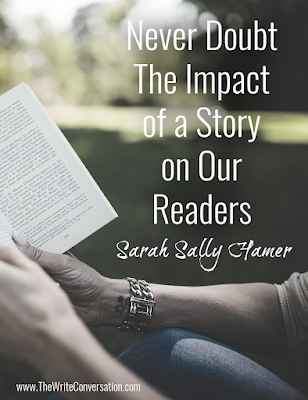
by Sarah Sally Hamer @SarahSallyHamer
Do our stories have impact on our readers? Can we change a life? How do we change a life?
All of those questions are hard ones to answer. As an avid reader for my entire life, I have been impacted by more stories than I can describe. In fact, sometimes I learned a lot of amazing wisdom from a fictional story, something I applied and was the better for. It also inspired me to try to write things that might help other people with their own situations.
I was fortunate enough to attend a presentation of the 50th anniversary North American tour of Jesus Christ Superstar in New Orleans recently. I’d never seen it before, but I knew the story and what would happen. It was an incredible event. I was given the privilege to speak at the cast party after that performance -- I had a story I wanted to tell them.
When I was much younger, I lived with my family in a small town in Missouri at the bottom of a hill. One of my sister’s “wild child” friends was coming to visit. He had dropped out of high school a couple of months before and was running with a tough crowd. We could hear his motorcycle come over the hill and, as soon as he crested it, he started singing at the top of his lungs. “Jesus Christ! Superstar!” which echoed through the valley.
When he pulled up in the driveway and took his helmet off, he asked us, with a huge grin on his face, if we knew that Jesus had walked across a swimming pool. He didn’t, because he’d never been to any church, had no real knowledge of the story. He spent the next hour describing every scene in the movie. Experiencing it changed his life. He went back to school and became a better man.
I wanted to tell the cast that memory of mine because we never know exactly who will we affect with our own stories. People we will never meet at any time in our life may find something important or even life-changing in our words, simply because it touches something deep inside of them. Of course, the crucifixion story stands on its own, but we each have a story to tell, something that can really matter. Even if we never know it.
So, back to my questions. Do our stories have an impact on readers? Possibly. We are the children of survivors, who taught us important things. They may make a difference to someone else. Can we change a life? Maybe. What have you learned that you can share? Maybe it’s a story of a family finding solutions to their problems. Or a person overcoming an event of major proportions.
Finally, how do we change a life? Simply by being honest with ourselves and others. By telling our stories. By caring about others enough to share.
What stories have changed your life?
TWEETABLENever Doubt The Impact of a Story on Our Readers from @SarahSallyHamer on @EdieMelson (Click to Tweet)
 Sarah (Sally) Hamer, B.S., MLA, is a lover of books, a teacher of writers, and a believer in a good story. Most of all, she is eternally fascinated by people and how they 'tick'. She’s passionate about helping people tell their own stories, whether through fiction or through memoir. Writing in many genres—mystery, science fiction, fantasy, romance, medieval history, non-fiction—she has won awards at both local and national levels, including two Golden Heart finals.
Sarah (Sally) Hamer, B.S., MLA, is a lover of books, a teacher of writers, and a believer in a good story. Most of all, she is eternally fascinated by people and how they 'tick'. She’s passionate about helping people tell their own stories, whether through fiction or through memoir. Writing in many genres—mystery, science fiction, fantasy, romance, medieval history, non-fiction—she has won awards at both local and national levels, including two Golden Heart finals.A teacher of memoir, beginning and advanced creative fiction writing, and screenwriting at Louisiana State University in Shreveport for over twenty years, she also teaches online for Margie Lawson at www.margielawson.com. Sally is a free-lance editor and book coach at Touch Not the Cat Books, with many of her students and clients becoming successful, award-winning authors.
You can find her at hamerse@bellsouth.net or www.sallyhamer.blogspot.com
Published on January 31, 2023 22:00
January 30, 2023
8 Tips to Help Writers Break the Cycle of Procrastination
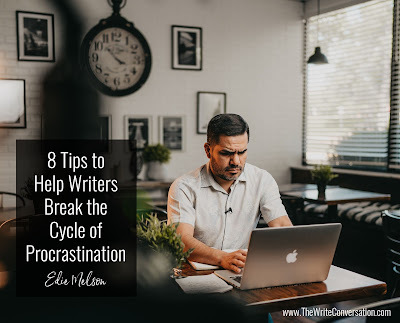
by Edie Melson @EdieMelson
I love writing. And I love talking about writing.
Sitting around with other writers, discussing all things literary is one of my favorite things. It’s one of the reasons I love attending writing conferences.
But there are people we know who like talking about writing so much that’s all they do. They join writers groups, critique groups, even take classes.
The one thing they don’t do is write.
Unfortunately, this problem of avoidance can happen to any of us.
Writing is hard work. Avoiding it is often easier than just sitting in the chair and banging out words. There comes a time though, when we have to just quit procrastinating, sit in the chair and write.
Today I’m going to share some things I do when I’m tempted to do anything but write.
1. Set a goal. I play games with my goals. Sometimes I’ll set a time goal—I’m going to write for an hour—no matter what. Sometimes I’ll set a word count goal—I’m not going to get up until I’ve written 1000 words.
2. Set a reward. I try to avoid food related goals, but truthfully, nothing helps the words flow like the promise of chocolate. However, the promise of a new pair of shoes after turning in a big project also works for me!
3. Break it into manageable pieces. Don’t tackle a hard goal all at once. Break it into small manageable bits. This will help you see the progress.
4. Turn on the music. For me, music (instrumental—no words) helps me get in the groove.
5. Change the scenery. When I hit a wall, it helps to go around it—literally. If I’m in my office, I may move to the dining room or even the back porch.
6. Turn off the Internet. Or at least log off your social media. It’s tempting to ask for support or commiseration on Facebook, but it can lead to conversation. And the only words you need are the ones that show up on the page.
7. Schedule a Write-in. Get a friend or two and hold each other accountable. If you can’t meet in person, get together online, through Skype or a Google Hangout.
8. Throw up on the page. NO, not literally. But I’ve found that sometimes I have to write junk before I can get to the good stuff. So go ahead and write crap, get it out of the way and keep going. Chances are there is something useable in it.
Now I’d like to hear from you. What tricks have you found to keep yourself in the chair banging out words?
TWEETABLE8 Tips to Help Writers Break the Cycle of Procrastination from author @EdieMelson (Click to Tweet)
 Edie Melson is a woman of faith with ink-stained fingers observing life through the lens of her camera. No matter whether she’s talking to writers, entrepreneurs, or readers, her first advice is always “Find your voice, live your story.” As an author, blogger, and speaker she’s encouraged and challenged audiences across the country and around the world. Her numerous books reflect her passion to help others develop the strength of their God-given gifts and apply them to their lives. Connect with her on her website, through Facebook, Twitter and Instagram.
Edie Melson is a woman of faith with ink-stained fingers observing life through the lens of her camera. No matter whether she’s talking to writers, entrepreneurs, or readers, her first advice is always “Find your voice, live your story.” As an author, blogger, and speaker she’s encouraged and challenged audiences across the country and around the world. Her numerous books reflect her passion to help others develop the strength of their God-given gifts and apply them to their lives. Connect with her on her website, through Facebook, Twitter and Instagram.Featured Image: Photo by Jose Cerrato on Unsplash
Published on January 30, 2023 22:00
January 29, 2023
A Rich Valentine's Day for Writers

by Yvonne Ortega @YvonneOrtega1
Valentine’s Day for writers can be wonderful regardless of our marital status. Perhaps no earthly person cares about our audience and us. God cares. Jesus cares, and so does the Holy Spirit. God’s call on my life as a speaker, writer, and coach demands I care about the Trinity.
I want to be a role model not only for clients but also for loved ones at home and those with whom I come in contact.
Valentine's Day for writers and God the Father
As a single person, I choose to tell God the Father I love him and the audience he gives me. A friend of mine says, “God, thank you that you’re large and in charge.”
Another friend sent me a Happy New Year message and wished me a good flight #2023. I thought it meant my heavenly Father God would send me to countless hurting women to offer them hope and healing through Jesus Christ. I dusted my suitcase, washed the velour travel blanket, and strolled through the house with that spinner wheel suitcase to pack it.
So far, I’ve been to the drugstore twice for medication for a stubborn sinus infection and a stuffy nose and to the grocery store again for more organic chicken bone broth and organic unsweetened coconut to kill the taste and smell of the bone broth.
The Names of God
When I meditate on God’s names in the Bible, my understanding of his love for me, my audience, and others grows. I thank God he is:Jehovah Nissi, the Lord My BannerJehovah Rapha, the Lord Who Heals MeJehovah Jireh, the Lord Who Provides
How much time do you devote to God on Valentine’s Day to meditate on his names, tell him how much you love him, and introduce him to others?
Valentine's Day for writers and Jesus the Son of God
How does Jesus care for my audience, me, and my loved ones? According to the Bible, “Now if we are children, then we are heirs—heirs of God and co-heirs with Christ, if indeed we share in his sufferings in order that we may also share in his glory” (Romans 8:17 NIV).
I confess it’s easier to share in his glory, but I must also share in his sufferings. On Valentine’s Day, I thank Jesus for what he did to make me a princess in God’s family.
The Life and Teaching of Jesus
Through the life and teaching of Jesus Christ, I’ve grown in my faith to trust and obey the Lord. Thomas, one of the disciples, said he didn’t know where Jesus was going so how could he know the way? Jesus answered, “I am the way and the truth and the life. No one comes to the Father except through me” (John 14:6 NIV).
Statistics show many leave the life and teaching of Jesus during or after college. On Valentine’s Day, I consider how blessed I am to have believed after college.
Jesus my High Priest
“Since then we have a great high priest who has passed through the heavens, Jesus, the Son of God, let us hold fast our confession. For we do not have a high priest who is unable to sympathize with our weaknesses, but one who in every respect has been tempted as we are, yet without sin” (Hebrews 14-15 ESV).
Thank you, Jesus, that you are my high priest. You sympathize with my weaknesses, but you are the perfect ultimate sacrifice without sin or blemish. You know about my struggles with perfectionism, an empty email box by dinner, and the completion of my daily speaking, writing, and coaching goals.
Through your strength and grace, I will celebrate Valentine’s Day first with you.
Valentine's Day for writers and the Holy Spirit
How does the Holy Spirit fit in with Valentine’s Day for writers?
“But when the Helper comes, whom I will send to you from the Father, the Spirit of truth, who proceeds from the Father, he will bear witness about me” (John 14:26-27 NASB).
Thank you, God, for the Helper, the Spirit of truth. When I face reality, I don’t rush through Bible reading, prayer, and meditation. That makes Valentine’s Day a special occasion.
Defense from the Holy Spirit
“When you are brought before synagogues, rulers and authorities, do not worry about how you will defend yourselves or what you will say, for the Holy Spirit will teach you at that time what you should say” (Luke 12:11-12 NIV).
Thank you, Holy Spirit, I’d rather not worry and stress.
Hope from the Holy Spirit
“May the God of hope fill you with all joy and peace in believing, so that by the power of the Holy Spirit you may abound in hope” (Romans 15:13 ESV).
Thank you, Holy Spirit, by your power I abound in hope, especially during a time of darkness and a high suicide rate in our country. When reminders of presentation deadlines and a social media platform attempt to monopolize my thoughts, may I focus on joy, peace, and an overflow of hope.
How will you make Valentine’s Day wonderful?
TWEETABLEValentine's Day for Writers, from author & speaker @YvonneOrtega1 on @EdieMelson (Click to Tweet)
 Yvonne Ortega walks with a small footprint, leaving a giant imprint in the lives of those she meets. Within this power-packed package is a professional speaker who offers encouragement, support, and accountability. Her calling to help women who face challenges move forward and live the abundant life through Christ has endeared her to thousands. As a gifted instructor, she helps those who speak and write make connections and find community. In addition to being a multi-published author, known for her Moving from Broken to Beautiful Series, she has degrees in Spanish and English and a master’s degree in education in counseling from the College of William & Mary.
Yvonne Ortega walks with a small footprint, leaving a giant imprint in the lives of those she meets. Within this power-packed package is a professional speaker who offers encouragement, support, and accountability. Her calling to help women who face challenges move forward and live the abundant life through Christ has endeared her to thousands. As a gifted instructor, she helps those who speak and write make connections and find community. In addition to being a multi-published author, known for her Moving from Broken to Beautiful Series, she has degrees in Spanish and English and a master’s degree in education in counseling from the College of William & Mary.You can find Yvonne at YVONNEORTEGA.COMAMAZON AUTHORFACEBOOKYOUTUBETWITTER
Published on January 29, 2023 22:00



